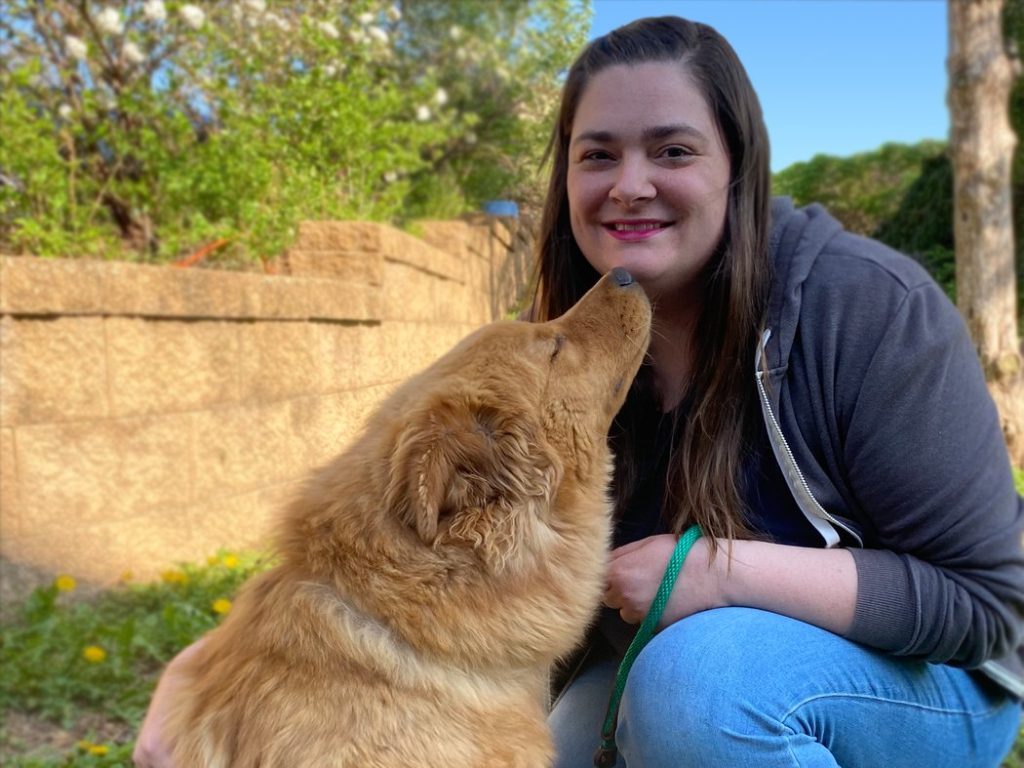
Animal expert, Ashley Flores, CPDT-KA, is the Senior Director of Animal Behavior, Foster & Rescue. Ashley studied under the Council of Certified Professional Pet Dog Trainers (CCPDT), is CPDT-KA certified and American Kennel Club Canine Good Citizen (CGC) certified for nine years. She also earned certification for Behavior Pharmacology and Separation Anxiety through Heartland Positive Dog Training Alliance (HPDTA) Training. Email askashley@greatplainsspca.org for a chance to have your pet question answered in KC Parent magazine.
About a year ago, I adopted a beautiful German Shepherd mix named Ariana. She is a very sweet dog, with a mild temperament and has taken well to training. The only issue she has is she really enjoys licking skin, especially hands. She does this until you move or ask her to stop. Is this because of the salt in our skin? Thanks for everything you do! – Chris Kennedy
Ariana’s licking is a natural and instinctive way to communicate with you. She may be licking you for a variety of reasons such as expressing herself, trying to bond with you, showing empathy, letting you know that she is stressed, or just because you taste good to her. I would not be concerned with this behavior unless it becomes excessive. Then you can train her to stop as you have been doing. – Ashley Flores, CPDT-KA
I have two young Australian Shepherds who eat feces. I have tried prescription meds and over-the-counter deterrents, but they have not worked. Any other tips to stop this behavior? – Laurie
Coprophagia (eating feces) can be a tough habit to break for many dogs. Trying to find out why they eat poop is key in understanding how to curb it. Dogs may eat poop because of stress, parasites, boredom, poor diet, issues with their pancreas, and sometimes they just do it because they enjoy it, which is one of the tougher ones to break. Try to find out why, then you can work on it. I also recommend hanging out with your pooches outside so you can pick their stool up immediately and redirect them from eating it. Do this for a few months and work on the commands “leave it” and “come” so you can direct them without being close by. – Ashley Flores, CPDT-KA
My 10-year-old very good girl, Lola, has always loved her walks. Within the last six months to a year, she has started to hide when the Amazon truck is in our neighborhood. Unfortunately, as time has passed, she is now afraid to leave the house on walks. We have been patient with her and at times can coax her into walking down the street. Ultimately at some point she becomes startled and wants to immediately return home. Do you have any recommendations for us to try? Lola always enjoyed her walks, and it is breaking our hearts to see her like this. – Brandon
Sounds like something scary may have happened in the past and now walking is causing her anxiety. I recommend practicing walking in the back yard or in places that are not frightening for her and going out a little further into the street every day. This can even mean only an extra couple of feet at a time. You may want to practice walking when your street is less busy with low stimuli or triggers to build a positive association. You can also start by putting a blanket in the front yard and having little picnics and getting her used to hanging out in the front yard, then walking a little bit afterwards around the house and venturing further out if she chooses. Anything to create a positive interaction with her being outside is crucial. Stick close to home in case she gets nervous and constantly praise any confidence she is displaying. Take it slow and don’t expect quick changes. If she is enjoying her time outside, whether that’s walking or not, that is still enrichment for her. – Ashley Flores, CPDT-KA
Email askashley@greatplainsspca.org for a chance to have your pet question answered in KC Parent magazine. We also have new Behavior and Training classes starting soon! Great Plains SPCA alumni receive $50 off of new class sign up. CLICK HERE to sign up today!

